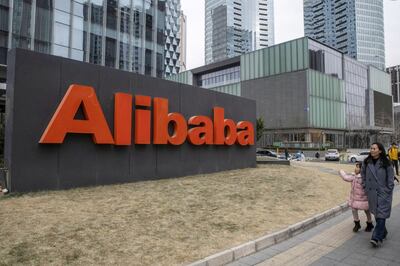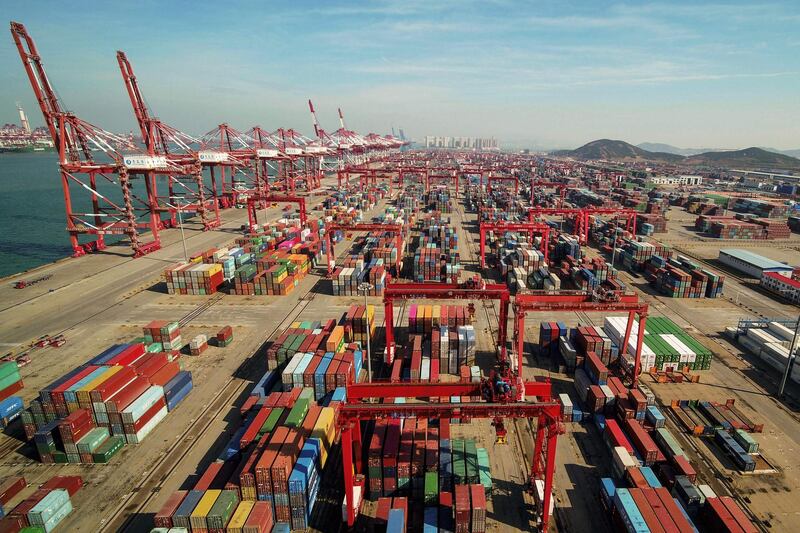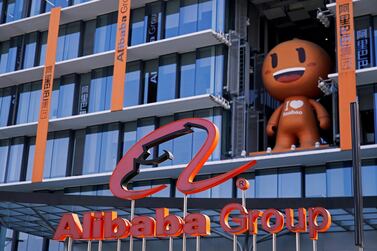The impediment to the growth of e-commerce is no longer consumer demand, which has soared in the past year as many shoppers have been unable or unwilling to visit brick-and-mortar stores due to the coronavirus pandemic.
The drive for efficiency has become even more critical as border closures and lockdown restrictions have made deliveries trickier. Brexit has been an added challenge for many shops in the UK.
The logistics companies that transport these goods from warehouses to our doors are vital to retailers, and even governments as they look to logistics companies to transport coronavirus vaccines. But traditional methods of shipping goods are inefficient and wasteful.
There is now another option for merchants of all kinds. Cainiao lives in the shadow of its parent company, Chinese internet giant Alibaba. But it has been quietly building an unconventional logistics platform that could transform the distribution of products in future.
The brainchild of Chinese tycoon Jack Ma and others, Cainiao is different from traditional logistics companies because it does not own most of the warehouses or depots it cleverly leverages. Instead of buying trucks and fuel, it has built up a 3,000-strong network of “logistics partners” who do the actual deliveries.
Cainiao carefully curates and aggregates established logistics partners. This scale provides merchants with ample data to choose the most efficient delivery option through the Cainiao platform.
The company puts sensors on everything and is bringing about a digital revolution in distribution. After achieving strong traction at home in China’s $2 trillion e-commerce market, the company is starting to expand globally in Belgium, Malaysia, Russia, Thailand and Dubai without ever building a single warehouse.
This asset-light approach has allowed Cainiao to piggy-back off existing infrastructure and to scale up quickly in a mature sector, while avoiding steep fixed costs while being nimbler. This way, it is able to respond quickly to changes in market demand.
At a time when logistics companies are vital to e-commerce and vaccine delivery, this resilient model strengthens supply chains. Brexit complications have further highlighted the need for a strong logistics network today. If a logistics partner goes bust or leaves the platform, it will not compromise the stability of the wider network because the slack can be absorbed quickly.
Technology and data are at the heart of the model, which streamlines deliveries. Cainiao tracks all the transactions in its ecosystem and crunches the data to produce actionable insight that benefits everyone, including the end consumer who gets greater availability of products.
Cainiao uses predictive analytics to forecast consumer demand and help its partners allocate stock and pick warehouse locations. It also uses data from delivery fleets to optimise shipping routes, improving efficiency and trimming fuel costs. When more partners join, not only does the ecosystem diversify, the efficiency of the whole network increases.
The company has also created more than 80,000 “Cainiao Post” stations where people can pick up their orders, with the goods dropped off by local couriers. These stations are embedded within local communities such as schools and create sustainable, viable job opportunities. This form of community entrepreneurship is reminiscent of the township and village enterprises that played a pivotal role in China’s transition to a more market-based economy following reforms enacted in the late 1970s.

The company does not represent an existential threat to traditional delivery operators. Rather, Cainiao can be the rising tide that lifts all boats. Instead, the threat is levied at e-commerce platforms such as JD or Amazon, which has taken an asset-heavy approach, building vast fulfilment centres all over the world.
Since Cainiao is part of Alibaba, it can offer merchants a full suite of services. A retailer could sell their goods on Taobao, Alibaba’s e-commerce platform and process the transactions on its payment platform Ant Financial. Sellers are free to choose other providers. Increasingly, though, they will be tempted to be part of the Alibaba ecosystem for the efficiency gains, which will become more crucial in weathering the coronavirus-induced recession.
But China has launched an antitrust probe into Alibaba, which it accuses of monopolistic practices. That followed the suspension of Ant’s $37 billion initial public offering. How such an investigation will hit Cainiao’s growth remains to be seen, but the open nature of Cainiao’s ecosystem appears to be prepared for the future.
The good news for sellers, who will be on the lookout for stability in these uncertain times, is that, without a heavy base of fixed assets, the company can be agile in responding to market regulators. This reflects how new models of trade can enable wider economic and social success.
Mark Greeven is Professor of Innovation and Strategy at IMD






